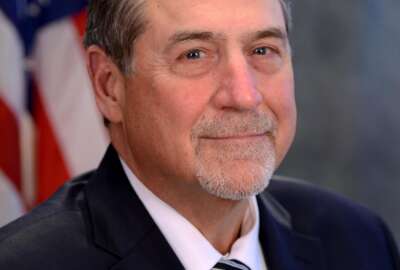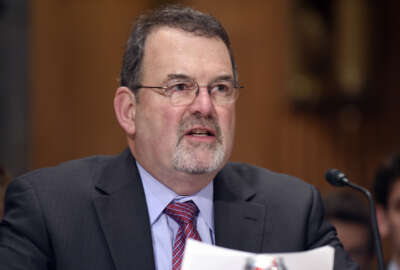
Commerce CIO: More flexibility needed for industry collaboration
Commerce Department CIO Steven Cooper says he'd like to see more flexibility when it comes to acquisition and collaboration with industry. One way to get it, he...
Protecting personal census information or sharing vast amounts of environmental data are innovative ways in which the government partners with industry, but more flexibility is needed if agencies want to take full advantage of that collaboration.
That’s the opinion of Commerce Chief Information Officer Steven Cooper, who shared his thoughts on collaboration and acquisition during a June 29 Bloomberg Government event in Washington.
His suggestion: Weave language into the IT Modernization Fund, making it easier to “give us the opportunity to team up with the private sector.”
“I’m gonna do the best I can to kind of push [Federal CIO Tony Scott], if you guys push from the outside so to speak,” Cooper said. “Just give us the opportunity to use [modernization money], it doesn’t have to be used that way, it could still be department-centric … tie language to the modernization fund that would allow us to pull this off.”
Speaking to the audience several hours later, Scott said while he was “leery of being too specific in a bill,” he agreed with Cooper’s approach.
“One of the things that kind of bugs me, in the current state, we’ve locked ourselves out of what I would call the unsolicited proposal kind of thing, from our private sector and supply community,” Scott said. “As a private sector CIO, this was often one of the most fertile things that I could take advantage of; I could give you a long list of examples where a company approached me and said ‘hey Tony, we’ve got a great idea, it could do this or that or the other thing.’ And we ran a little test, a little experiment, said ‘yep, that’s right, it can,’ and we want ahead and did that.”
Right now there isn’t really a good way for the federal government to do that, Scott said. While there are some contests where government can put out a prize or a challenge, Scott said he’d like to encourage more unsolicited proposals, “the things that are really great ideas.”
“Today’s there a bit of a bar for companies doing that, because they’ve had the experience, quite frankly, that somebody will take their good idea and give it to their competitor and do a bake-off and try to get the lowest price,” Scott said. “In the end I’m not sure that works particularly well. It tends to discourage innovation rather than encourage it.”
Figuring it out
When it comes to discouraging ideas and parternships, Cooper said there is not a lot of multi-department engagement within the government.
“I’m gonna tell you, I don’t think we do that aspect of collaboration well,” Cooper said. “In other words, everybody’s trying to figure out, as a CIO, how do we get better at defending against cyber threats and vulnerabilities. There are some things that we’re doing, but it’s policy driven, that’s kind of where the collaboration [is], it’s not operational. So how do I get together with my colleagues and actually pool resources to tackle that particular problem.”
That leads to the problem that as a CIO, if he’d like to use Commerce money to help another department with a problem, that runs afoul of appropriations law, Cooper said.
“What I am saying is there are very real restrictions set forth by Congress on what we can spend money on, if the money has been appropriated to the Department of Commerce, perhaps my office, or the bureau’s,” Cooper said. “We can’t, without Congressional approval, spend Commerce-appropriated dollars to help another department solve a similar problem.”
If Congress could consider allowing some flexibility on smaller amounts of funding that could be used in shared initiatives, “that might be a way to foster more effective collaboration,” Cooper said, which is how he tied in the modernization fund.
The $3.1 billion IT Modernization Fund has gained some traction in Congress. Under the proposed legislation, agencies would come forward with a business case and receive incremental funding as they hit deliverables and milestones toward updating their information technology systems. Over a five-year period, that agency would pay back to the fund, which would then allow for another round of money to be doled out to help agencies.
And while it’s easy for companies to meet with other members of industry, even if he wanted to meet with companies Commerce is already working with to talk about something ahead of an acquisition, he would violate acquisition law, Cooper said.
“I can’t meet with three or four of you to get your ideas and input. I have to open it up to everybody. That’s ok, I’m not complaining, but the ability to simply sit down and talk together to solve problems is challenging,” Cooper said. “I think there are a couple areas where with some creative brain power being applied, we could change the paradigm, to allow and foster collaboration.”
That could require modification of the Federal Acquisition Regulation, Cooper said, but that wasn’t his wheelhouse.
“You guys have contracting folks that know that FAR in and out, government contracting folks that know it in and out,” Cooper said. “Maybe the contracting folks ought to get together and tackle this. My point being, I bet you we could figure this out. And to me, this is an opportunity for collaboration that I don’t think we’ve tackled before.”
Copyright © 2025 Federal News Network. All rights reserved. This website is not intended for users located within the European Economic Area.
Related Stories




